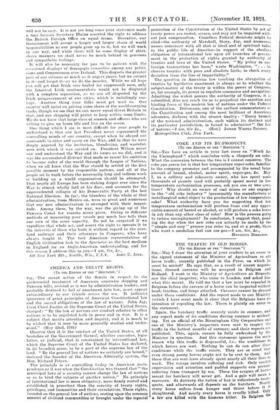AMERICA AND TREATY RIGHTS.
[TO TOE EDITOR OF THE " SPECTATOR."]
SIR ,—The recent action of the Senate in respect to the preferential treatment of American coastwise shipping and Panama tolls, resisted as it was by administration leaders, and probably destined to fail of enactment into law, must appear extraordinary to our friends across the sea. It indicates ignorance of great principles of American Constitutional law and the sacred ,obligationi of the law of nations. John Jay, First Chief Justice of the Supreme Court of the United States, charged : "By the law of nations our conduct relative to other nations is to be regulated both in peace and in war. It is a subject that merits attention and inquiry, and it is much to be wished that it may be more generally -studied -and under- stood." (May 2nd, 1793.)
Observe that it is the conduct of the United States, of all branches of the Government thereof, whether executive, legis- lative, or judicial, that is constrained by international law, which the Supreme Court of the United States has declared, in its broadest sense, to be a part of the supreme law of the land. " By the general law of nations we certainly are bound," declared the founder of the American Admiralty system, the lion. Richard Peters.
The Principle is as controlling to-day in American juris- prudence as it was when the Constitution was framed that " the municipal laws of a country cannot change the law of nations so as to bind the subjects of another nation." No principle of international law is more obligatory, more firmly rooted and established in precedent than the sanctity of treaty rights, privileges, and immunities and their correlatives. These rights, founded on the general law of nations, resting upon-the common consent of civilized communities or brought under -the especial protection of the Constitution of the United States by act of treaty power are vested, secure, and may not be impaired -with- out just compensation. Countless Federal decisions might be cited—the authority of Marshall, Story, Jay, and .numerous names consonant with all that is ideal and of spiritual valet: in the public life of America—in support of the absoluts obligation of international law upon all branches of govern- ment • in the protection of rights granted by authority of treaties and laws of the United States. " My policy in our
foreign transactions has been," wrote Washington, . to observe treaties with pure and absolute faith; to check every deviation from the line of impartiality."
The question in American law touching the abrogation of treaties by legislative enactment is always as to whether the subject-matter of the treaty is within the power of Congress, as, for example, its power to regulate commerce and navigation. Admitting the widest powers the authority-of Congress, it is submitted, does not reach (so as to prejudice) the sanction and binding force of the modern law of nations under the Federal Constitution. Dufonceau, one of the earliest commentators of the Constitution and among the most brilliant of American advocates, declares with the utmost finality : "Every branch of the national administration, each within its distinct and its particular jurisdiction, is bound to administer" the law






































 Previous page
Previous page